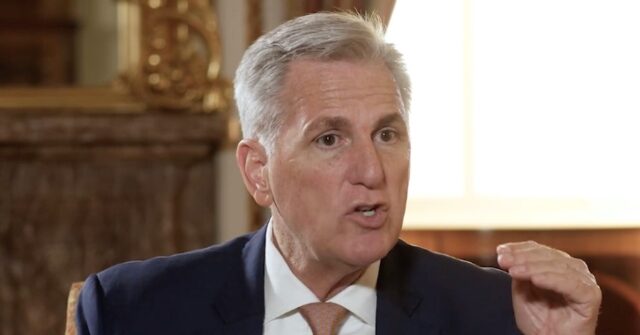

U.S. House Speaker Kevin McCarthy told Breitbart News in no uncertain terms that the House of Representatives this year will not pass a clean debt ceiling hike without spending cuts and that the House will not raise taxes.
“The one thing I firmly believe,” McCarthy said, is “We’re not going to raise taxes and we’re not going to pass a clean debt ceiling.”
“I told the president we have to spend less money,” McCarthy added.
McCarthy said that without serious reforms to discretionary spending the U.S. could be on the brink of serious financial calamity.
“Every great society collapses when they over-extend themselves,” McCarthy told Breitbart News.
Such a dire warning from the nation’s highest-ranking elected Republican came just hours before Silicon Valley Bank (SVB) collapsed on Friday, setting off fears of a broader financial crisis possibly looming in the United States. SVB’s collapse came in large part as a result of high and persistent inflation. In an attempt to tame inflation, the Federal Reserve hiked interest rates rapidly, which undercut the bank’s long-term investments in lower-interest rate government-backed securities.
McCarthy’s comments were taped last Wednesday during an exclusive long-form on-camera interview with Breitbart News in the ceremonial speaker’s office in the Capitol, the latest in the On The Hill in-depth video series. McCarthy, in the hourlong interview, covered many topics including his release of the January 6 U.S. Capitol surveillance tapes, corruption investigations into President Joe Biden’s family business operation, the wide open U.S. southern border, and the rising threat of the Chinese Communist Party (CCP).
While McCarthy has made it clear he wants serious cuts to non-essential discretionary government spending in order to slow inflation—he does not intend to cut Medicare or Social Security—he was not specific in this interview about exactly how much in terms of such cuts he was looking for.
“I do not predetermine what that is, but what I laid out with the president is: We’re going to spend less money,” McCarthy said when asked if there is a specific dollar amount worth of cuts that would win his approval for a debt ceiling deal.
McCarthy also pointed to savings Americans can achieve by securing the border and pushing for energy independence as possible pathways to a broader deal.
“Another dollar amount you would look at is not just all the savings, but what if you were able to secure the border?” McCarthy said. “What if you were able to become energy independent? That’s a lot of savings in itself because you have the price of fuel lower so people can work, that more jobs would come to America.”
When asked to explain what the debt ceiling is, and lay out the terms of the looming battle with Biden and a Democrat-controlled U.S. Senate, McCarthy compared it to the spending limit on a maxed-out credit card a parent would give their child.
“Look, the debt ceiling is very serious—and we’ve got to understand what the debt ceiling is and just to put it down it’s like providing your child with a credit card,” McCarthy said. “They charge all the way up to the limit, and you’re responsible for paying it. But do you raise the limit without changing the behavior or do you change the behavior?
McCarthy pointed to previous times in fairly recent U.S. history, like specifically the Gramm-Rudman-Hollings Balanced Budget and Emergency Deficit Control Act of 1985 from then-Sens. Phil Gramm (R-TX), Warren Rudman (R-NH), and Fritz Hollings (D-SC), as proof of Republicans and Democrats working together to curb spending. He said reforms like those throughout history “made America stronger.”
“Right now we have inflation because of the Democrats’ runaway spending,” McCarthy said. “Really, what people want to look at: Is it a spending problem or is it a revenue problem? Our spending is $31 trillion of debt. You just had the Congressional Budget Office just come out a couple weeks ago and tell us a forecast for the next 10 years. What they say is in the next 10 years we will end up paying $10.5 trillion just in interest. So it’s just like paying the interest on your credit card and never taking on the principle. Now put that in perspective. How much interest have we paid in the last 80 years? Let’s go back to 1940. If you add up all the interest that we paid for our debt since 1940 today it’s $9 trillion. So what took you more than 80 years, you’re going to pay more in 10 years.”
McCarthy said that Democrat President Joe Biden’s position is that taxes should be raised to pay for this, but he fundamentally disagrees and argues that revenue is not the issue and that revenue as compared to Gross Domestic Product (GDP) is at or near an all-time high.
“Now let’s compare: Is the problem we need more revenue?” McCarthy said. “Well, when you look at the revenue that’s coming in, it’s about 20 percent of GDP. Well is that high or low? The 50-year average is 17 percent.”
McCarthy said that only a few times in history has revenue hit 20 percent of GDP, “so really we’re getting more money coffers into the coffers of government, but what the Democrats have done is they have increased discretionary spending by more than 30 percent.”
“They increased all this spending and that’s what put us into this problem, the $6 trillion that the Democrats added,” McCarthy said. “So we’re in a real problem.”
Biden has essentially already caved to the Republicans on the debt ceiling since his initial position was he would not negotiate at all. But now, Biden is having conversations—in public, like during the State of the Union address, and in private. like with his first one-on-one meeting with McCarthy a little over a month ago—and calling for Republicans to put forward their plan and begin negotiations, as he did in a speech this month rolling out his budget plan.
“What I told the president is we can sit down and we can talk,” McCarthy told Breitbart News. “He thinks you should just raise the debt ceiling and not negotiate. That’s not what history tells us. That’s not what the American people want—74 percent want us to sit down and solve this problem. Why? Because if you keep spending more, inflation comes. That’s what brought us inflation.”
McCarthy added that failure to rein in government spending only helps American adversaries, particularly the Chinese Communist Party (CCP), because the U.S. is paying tens of millions of dollars in interest payments on the debt to China every single day.
“It gives an advantage to China over us,” McCarthy said. “We’re going to spend $60 million today paying China because of the interest. We’re going to do that tomorrow, and the day after and the day after. I’d rather invest it in America. And we’re going to hurt our children and grandchildren.”
Republicans have yet to as a conference formally coalesced behind any specific plan, though some ideas have been offered by different factions, like the House Freedom Caucus or the Republican Study Committee on some principles they would like to see in place on this. McCarthy, for his part, called a formal briefing for the full U.S. House of Representatives in an auditorium normally reserved for classified intelligence briefings on U.S. military operations earlier this month, where he brought in leaders from the Congressional Budget Office to brief members on the debt.
“I just brought in the Congressional Budget Office director and I brought every Republican and every Democrat to the auditorium,” McCarthy told Breitbart News. “Normally, we have only done that for a classified briefing when there are some challenges to America, be it the military. Well, I think this is just as big an issue. I think it’s our biggest issue out there. So we’re all coming together because we’re not going to solve this problem just by ourselves.”
In addition to discretionary spending cuts, McCarthy also argued for energy independence, border security, reinstatement of some work requirements that Democrats have undercut, and a “recapture” of unspent COVID pandemic relief funds disbursed across the country.
“So there’s a lot of places we can find savings and we can make government more efficient—more effective,” McCarthy said. “We can end the pandemic, which would save us money. We could have federal employees go back to work. We passed a bill on that, and there were 47 percent of federal employees aren’t at work today in the office. So what I look at is a number of things. But we’ve got to get our fiscal house in order—it is the fundamental thing we have to do and put us on the path to balance.”
McCarthy was also particularly upset with Biden’s false claim during the State of the Union address that Republicans were seeking to cut Medicare or Social Security, programs he had even before the speech made very clear Republicans do not intend to touch at all.
“He knew it was a lie when he said it,” McCarthy said of Biden’s false statement during the joint address.
The reaction in the chamber was swift in response to Biden: Shouts from members that he was lying drowned him out, and then he started bargaining from the podium with them over what to do over the debt ceiling.
“It’s even louder in person than it is on television,” McCarthy said when asked what it was like in the room as he watched from sitting the behind the president as this moment played out. “What’s really sad is the president loses a lot of credibility when I publicly said we’re not cutting Medicare and Social Security, but he loses a lot of credibility when the reason why in this new Congressional Budget Office report for the next 10 years for the first time all three trust funds become insolvent in the next 10 years–the Highway Trust Fund, Medicare, and Social Security. So when they put in Obamacare, they raided Medicare. When they just did their inflation bill, they raided Medicare. So why do we have a problem? Why is it becoming insolvent even quicker? What the Democrats have done to Medicare. To turn around and know it’s a lie and to try to tell the American public that the Republicans are going after [these programs], we are the ones who have been trying to save it.”
As for whether or not Biden and Democrats will negotiate in good faith—it seemed from that moment during the State of the Union address that he might actually do so after that—McCarthy said it remains to be seen.
“I think only time will tell,” McCarthy said. “I mean, the president’s answer is to tax more. That’s the worst thing to do in an economy right now that has no growth. It’s the worst thing you can do with inflation, what he’s wanting to do as well. I think government spending less curbs inflation and it makes us stronger economically and eliminates waste in government.”







